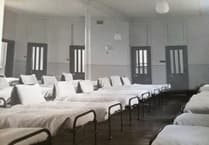OWNERS of long-term empty houses in Monmouthshire will have to pay up to three times more council tax from next year.
An additional charge is also set to be slapped on owners of second, or holiday homes, in the county after councillors backed the introduction of council tax premiums.
But Rachel Garrick, the Labour cabinet member responsible for finance, said the intention isn’t to raise extra funds from the properties that are already subject to the full council tax.
“That’s not the main driving part of this,” she said.
“It is to look to free-up housing in local areas to address housing shortages. We have a housing crisis, we have significant cost pressures on housing, we have too many people sat in bed and breakfasts across this county and this paper looks to address this.”
Premiums on long-term empty homes will rise on a sliding scale depending on how long they have been empty, with properties left unused for a year charged a 100 per cent premium increasing every year it is unused up to the maximum 300 per cent premium.
The sliding scale will apply from April 1, 2024, according to how long a property has been registered as empty since 2016.
The council also agreed to charge a 100 per cent premium on second homes, also from April 1 next year, but the cabinet will consider the impact on the local economy before enforcing the charge and could “wind back the proposal” following a review in the autumn.
The charge, based on current registered properties, could bring in an extra £1.6 million in council tax from empty properties and £365,000 from second homes.
Cllr Garrick said the council’s online public consultation, launched after the cabinet proposed the premiums on January 18, showed the public supported making those with more than one house pay more.
Of the 320 responses received, 63 per cent were in favour of a premium for empty properties, and 54 per cent backed an additional charge for second homes.
The most favoured premium was the 300 per cent charge, with 42 per cent of respondents saying it should apply to empty houses, and 44 per cent backing the highest premium on second homes.
The Caldicot Castle councillor read from some responses to the consultation from people who said how houses in their villages stood empty while young families had to move away and that holiday homes “cause a surge in house prices”.
Cabinet member for communities Sara Burch said the council has “for years” written to the owners of the some 400 long term empty homes to encourage them to bring them into use, and offer support, but said: “Past experience tells us we need the stick as well as the carrot.”
While there are just some 190 second homes in Monmouthshire, the Abergavenny member said: “Currently we are frequently seeing the impact of long term tenants being evicted so that the owners can use the house for holidays or put it on Airbnb. That impact isn’t just cost to the authority but children’s schooling and homelessness.”
Conservative Alistair Neill said just 29 of those who responded were owners of empty properties which he said was likely due to the consultation being held online.
The Gobion Fawr councillor said: “90 per cent of those (empty) home owners were probably unaware of those proposals, they will probably read about them in the newspapers.”
Conservative Rachel Buckler said she would vote against as the policy was being “rushed through” so the charges could be in place for next April and “the responses from purely online engagement were not properly indicative.”
Abergavenny Labour member Martyn Groucutt responded: “Isn’t there an irony in that if you’re a claimant for Universal Credit you have to do it online? If you’re a Monmouthshire second home owner somehow you don’t even know how to use the internet or email.”
Councillors were told all owners of empty and second homes were written to about the consultation.
Exceptions apply to empty homes with those being renovated, for sale or subject to probate exempt and the second home charge wouldn’t apply to properties, such as farm holiday lets, that aren’t suitable for full time use or if there are planning or legal restrictions on their use.
Following review by the council’s scrutiny committee the cabinet has said it could consider further potential exemptions and establish an appeals process.
During the debate Caldicot Labour member Jill Bond asked if councillors needed to declare an interest if they owned such properties but chair Cllr Laura Wright said she had made the standard call for declarations of interest at the start of the meeting and accepted councillors had responded “in good faith”.




